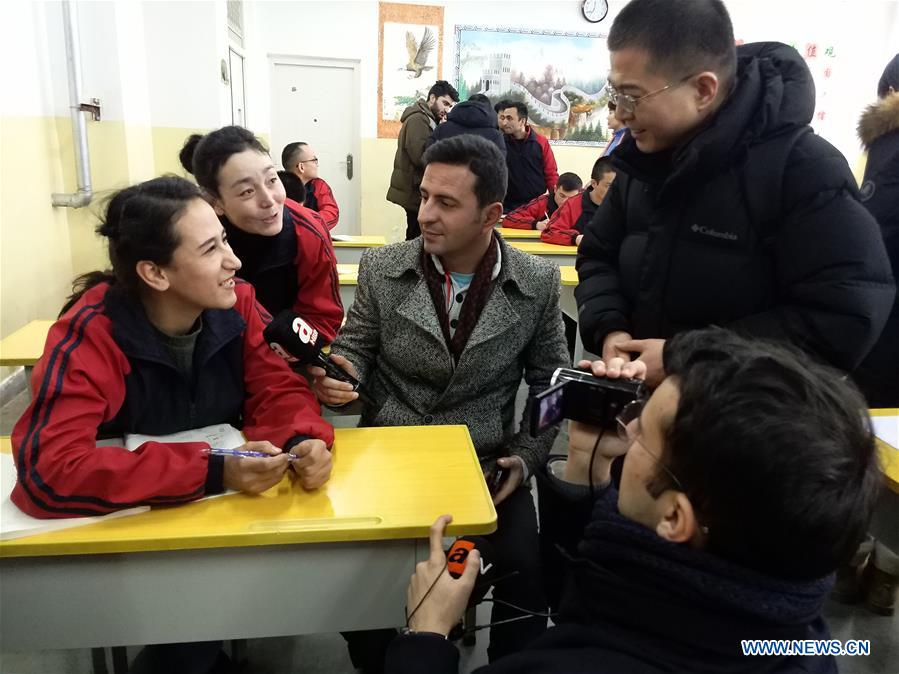

Editor’s note: Lyu Wenli is a research fellow of The Institute of Chinese Borderland Studies, Chinese Academy of Social Sciences; Xu Qiqi is an assistant researcher of the Academy of Contemporary China and World Studies, China Foreign Languages Publishing Administration. The article reflects the authors’ opinions, and not necessarily the views of CGTN.
In ancient China, where is known as Xinjiang Uygur Autonomous Region was known as the Western Regions. People familiar with history often have one historical episode in mind: during the reign of Emperor Wu of the Han Dynasty, two men in rags, short of food and water, staggered on the edge of the desert in the Western Regions. These two men were Zhang Qian and his guide Ganfu. They were envoys of the Han Empire on a mission to Xinjiang.
In hindsight, Zhang Qian successfully completed this diplomatic mission and explored the route from central China to the Western Regions, thus establishing the official overland Silk Road to the northwest.
Since the founding of the People's Republic of China 70 years ago, Xinjiang has gone through a period of rapid economic and social development. Its total economic output increased from 791 million yuan in 1952 to 1.2 trillion yuan (about 170 billion U.S. dollars) in 2018.
According to the 2018 statistics, Xinjiang's service reported a quick development. Over a hundred 4A and 5A rating scenic spots in the region received more than 41 million domestic and foreign visitors, up by 75.4 percent over the previous year, largely due to an improved overall environment free of terrorist and violent attacks there. It shows a sharp lift of tourists' confidence to Xinjiang’s stability.

A local resident waves to tourists in the Kashgar Ancient City, Xinjiang Uygur Autonomous Region, northwest China, June 15, 2019. /VCG Photo
Xinjiang’s development is premised on stability. Without stability, development is a nonstarter. Xinjiang has long been plagued by ethnic separatism, religious extremism and violent terrorism. Terrorist attacks occurred frequently over the last 20 years, causing great harm to the lives and properties of people of all ethnic groups. In recent years, Xinjiang has launched an extensive campaign against terrorism and extremism, including the establishment of vocational training centers. The result speaks for itself: there have been no terrorist attacks in the last three years.
The establishment of education and training centers is an effective measure to eliminate extremism given the history of Xinjiang. It is also a meaningful attempt made by the Chinese government as it draws on the experiences and practices of the international community in the field of preventive counter-terrorism.
Over the years, many countries in the world have also been trying to explore specific measures to combat terrorism and deradicalize extremists in their own countries or regions. For example, the strategy for countering terrorism issued by the British government in June 2018 emphasized the early intervention in those affected by extreme thoughts. In 2016, France announced that it would set up "deradicalization centers" in 12 regions of the country to help its citizens affected by extremist ideas return to ordinary life. The United States has tried to use community correction centers to reform young people affected by extreme thoughts.
Xinjiang's counter-terrorism and deradicalization campaign placed equal weight on countering terrorism according to the law and protecting human rights. It opposes linking terrorism and extremism with specific regions, ethnic groups or religions. It advocates for balancing compassion and severity and taking measures for prevention, education and rehabilitation. In the meantime, it also calls for maintaining stability and improving the standards of living. This is the "Xinjiang experience" in counter-terrorism.

Foreign journalists interview students at Kashgar vocational education and training center in Kashgar, northwest China's Xinjiang Uygur Autonomous Region, January 13, 2019. /Xinhua Photo
However, some Western politicians and media organizations have turned a blind eye to Xinjiang’s economic development and improved human rights situation due to deep-seated prejudice and ulterior political motives. They keep demonizing the education and training centers and constantly smear and attack China's Xinjiang policies. The U.S. State Department headed by Mike Pompeo has become increasingly paranoid towards the preposterous notion of "containing China through Xinjiang."
In June, the U.S. State Department released the 2018 Report on International Religious Freedom. Unlike its usual practice, it dedicates one separate section to Xinjiang. This shows how fanatic Pompeo and his underlings are on Xinjiang issues. Some other countries have followed suit and attacked China over issues related to Xinjiang whenever there is an opportunity.
But China has always stood by reason. Since last year, thousands of international reporters, envoys from various countries, experts and scholars, and religious figures have visited Xinjiang's education and training centers.
Some foreign media also spoke highly of Xinjiang's achievements in human rights protection and affirmed Xinjiang’s efforts in the fields of counter-terrorism and deradicalization. On July 26, ambassadors from 50 countries to the United Nations Office at Geneva (UNOG) co-signed a letter to the President of the UN Human Rights Council (HRC) and the High Commissioner for Human Rights to voice their support for China’s Xinjiang policy.
Ambassadors of other countries have echoed and supported China's position through letters and press releases. Many of these ambassadors have visited Xinjiang and witnessed the real situation there. In their letters, the ambassadors commend China for its economic and social progress, effective counter-terrorism and deradicalization measures, and strong guarantee of human rights.
The 70 years since the founding of the People's Republic of China have witnessed the great achievements in Xinjiang's economic development and social stability as well as harmonious coexistence of all ethnic groups. The international community should have its own fair view on Xinjiang's achievements in human rights, counter-terrorism and deradicalization, rather than manipulated by individual countries with their own agenda.
(If you want to contribute and have specific expertise, please contact us at opinions@cgtn.com)

Copyright © 2018 CGTN. Beijing ICP prepared NO.16065310-3
Copyright © 2018 CGTN. Beijing ICP prepared NO.16065310-3